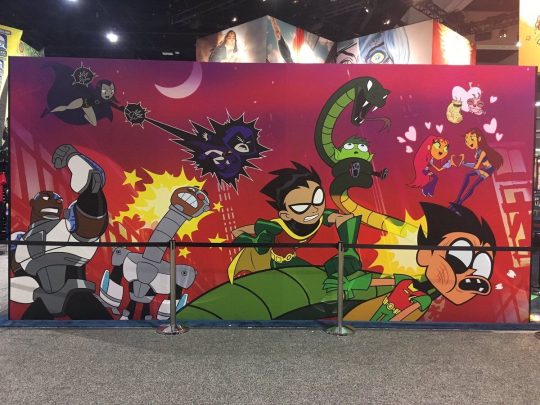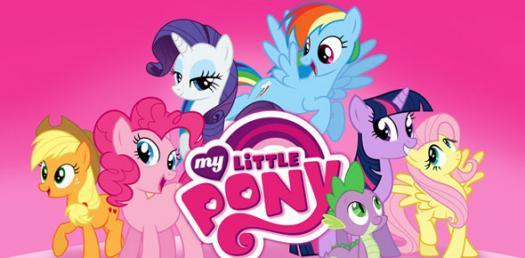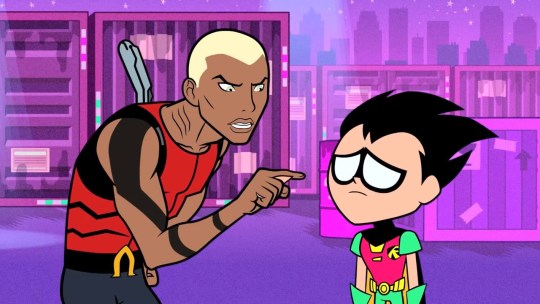
When I was interning a handful of summers ago, I remember talking with a handful of editors and peers about our favorite comic to television adaptations. I said honestly that I am not a fan of Teen Titans Go because I don’t think it has a lot of substance when compared to Teen Titans or Young Justice. It’s a problem I have with a lot of reboots, and I remember distinctly one of the editors saying that reboots “aren’t for you.” That’s a fair statement, they’re not for me specifically, they’re for… who exactly?
What the editor meant, I believe, is that a reboot isn’t really for the original fans of a series. It’s for a new generation to experience the characters and become fans. The characters we see from one show to another are kind of like reincarnated versions–they may have similar names and art styles but, the characters are kind of new because their stories are new. I think that this is often correct. However, I want to disagree a little with the idea that reboots aren’t aimed for older fans. Good reboots should have something that the older fans can enjoy too. I say this because clearly reboots in some ways market to the audience that watched the previous iteration(s), sort of like a big sign saying, “Hey, remember this show you loved as a kid? The one that we sold a lot of for a long time? Yeah? Great! Why don’t you check out our new version and show it to your kids/younger siblings/others?!” Their’s nothing really wrong with that, its an effective sales/marketing strategy, but for it to work the new iteration needs to have something old fans will appreciate.

A great example is My Little Pony: Friendship Is Magic – the series takes the older characters, characters that fans of the previous iterations have loved for a long time, and translates them to the current climate of television, allowing for a new generation of fans to fall in love with the characters. The new show still holds some elements of the underlying message that the original show or stories held. What I mean is that My Little Pony has always focused on friendships and what it means to be a good friend; this message has carried on over the years to what we see today. The old fans can appreciate that the morals or backbone of the show are still there and the new fans can fall in love with these reborn-characters on their own.
I remember watching the vintage version of MLP on youtube in middle school and loving it. When the new version came out around my junior year of high school, I never quite got into the show again, but when my nieces started watching it, I had no problem enjoying episodes in passing. The same thing happened in college when many of my friends liked binge-watching seasons of it on Netflix. While I still wasn’t a die-hard fan again, I enjoyed that the friendship elements were still there and felt comforted that my nieces not only enjoyed a collection of characters I had loved previously but also by the fact that the show was still teaching aspects of how to be a good friend and responsible individual. MLP FIM is a perfect example, to me, of what a reboot should be. It’s easy to merchandise to new and old fans (which the company producing it will like), it’s still got the elements needed for the nostalgic appreciation and a revival of the fandom in older viewers, and it provides something a new generation can enjoy. If I’m babysitting and my nieces and they say let’s watch it, I’m 100% down for the reasons stated above.
Now let’s look at shows like Teen Titans Go from 2013, or The Powerpuff Girls 2016. Are the shows merchandisable, of course–but do they hold true to the same values that we saw in the originals? I would say, No.
Teen Titans was a beloved show. We saw a mix of comedy and adventure expected of a story with teen superheroes, but we also saw some serious elements befitting characters who are transitioning between childhood and adulthood-for all intents and purposes-alone. They’re, in many ways, outcasts who are bound together by their friendship and a mission to protect the planet from harm. Their episodes are memorable and often have a deeper underlying message. In many ways, the show begins with an examination of crime, and the adult world at large, as being one of black-and-white. It’s how children often see the world, but as the series progress or even single episodes, characters learn that there is a lot more grey area and nuances than we previously thought or understood.

Like, I remember the episode “Sum of His Parts” where Cyborg confronts, not for the last time, challenges with his disability as a half-man, half-machine individual. While the robotic parts give him great abilities most of the time, there are situations where they become more of a hindrance than helpful. It was a meaningful episode that allows us to see that despite having a cool robotic exterior, and the name “Cyborg,” the character himself is a human being with complex emotions that will not always show on his face or in his interactions with others. When I first saw the episode, I remember Cyborg’s last line, “I am just like you, but it’s not your arm that makes us the same, its the stuff that’s connected to it.” It reflects a lot about the character and the emotions he has, as well as stating something about image and what’s inside. While I don’t have a robotic arm, I felt like a part of me was reflected in his character in that episode because I have insecurities (everyone does), and while I sometimes hide them well it doesn’t mean they aren’t there. I also remember the episode “Troq,” in which Starfire faces racism. She and her team (once they are informed of how she is being treated) must set aside their anger for the greater good. It’s a difficult episode for many reasons, the most important of which is that 1. Racism still exists and is something people must fight against 2. Sometimes you have to work with your enemy to prevent a greater evil from taking place. Both are difficult to accept, especially as children, but they’re realities of our world. As I get older, both seem to become more prevalent in my life, particularly the later as sometimes you have to work with awful people to get a job done. Even the former though is something I’ve had to see and face in life.
The original Powerpuff Girls, likewise to TT, had memorable episodes not so much for their imagery but for their stories. For example, “Equal Fights” is an episode I may never forget. In it, a female thief behaving like a radical who hates men points out to the PPGs that women have suffered a lot in history and uses this as an excuse for her behavior. It seems almost justified as retribution against the patriarchy for how women have suffered, at least, until the PPGs’ primary female role-models step to remind the girls and the audience that two wrongs don’t make a right. The common theme with these memorable episodes in these memorable shows is that we, the audience, should learn something from the presented morals and ideas. They encourage us to think more about our situations and our autonomy in society.
Overall, these shows attempted to help children navigate the difficult world around them–that is what made them beloved by their audience. Perhaps the greatest proof of this is that new shows that have gained popularity today seem to continue this message of helping youth transition into thoughtful adults – like, Steven Universe.

However, some of the reboots seemed to have missed this point entirely. Rather than aiming to create an encouraging message for kids, they instead aim to briefly entertain–like a meme. The episodes aren’t memorable, not really. I think the most memorable thing I’ve seen from Teen Titans Go is “Let’s Get Serious!” where Young Justice characters make a unique appearance. Aqualad critiques the Teen Titan Team about their ridiculousness and, in all, a very meta-episode in which the end leads us to believe that Teen Titans Go is just supposed to be a joke and we shouldn’t be so serious all the time about a children’s show. Ha Ha. (Let that sarcastic laugh sink in.)
I don’t have kids (yet), but I have nieces and nephews that I care about–and I know how easily kids can be led astray or tricked. Hell–I remember being a kid and how easily adults could manipulate me and my peers simply because they hold the authority. Adults can be manipulated too, I mean look at the Milgram Experiment. So when I look at these poorer reboots and see nothing of substance, when I look and see things that seem to encourage stupidity and lack of thought, I don’t feel like letting them watch the show because some of them aren’t old enough to understand that Beast Boy’s inability to open a textbook is supposed to be a joke. Particularly when he “saves the day” at the end. Sure, I can laugh at it, because I can see it as a joke, but one of my nephews might see a cool and funny superhero shoving a banana into his ear and think “that’s funny, I’ll do it too to make someone laugh” and end up with an ear infection (which is something a friend of mine’s little brother actually did).
In the case of Teen Titans Go, perhaps the creators really do intend for it all to be a joke, like a subversion of the original’s message(s). But then that, to me, is evidence that these are not truly marketed to a new generation of viewers–it’s marketed to the adults that watched the show previously. The joke is that the series is meant to be a form of high comedy with low comedy dialogue (if you don’t know what high comedy and low comedy are, please see here: https://www.enotes.com/homework-help/tell-me-about-origins-comedy-whats-difference-276012). If it is, in fact, not for the older audience, but to a growing generation, then I don’t think the joke is a good one because in some cases it insults the audience’s intelligence and in others overestimates the still-developing cognitive abilities of some viewers.
If TTG is for the former audience, I can appreciate it as a joke. I mean that sincerely, as I’ve found a handful of episodes to be funny and enjoyable. However, I would not recommend the show to kids.
As for I’ve seen some of PPG 2016, I can’t remember anything story-wise, only a collection of meme-like images, like the girls twerking. It’s, again, a show I wouldn’t want kids watching simply because it doesn’t seem to have any value–even from a comedic standpoint.
Of the reboots I’m mentioning, there are many more.
In conclusion, I think that good reboots are intended to be primarily for a new generation of viewers but also hold something that a majority of the previous iteration(s)’s audience(s) can appreciate or even love. Bad reboots focus on the “instant gratification” of entertainment and seem to ignore part of what made the originals so great. They seem to be created for meme-like instant laughs, not memorable content. That seems like a flaw to me but clearly works as a selling point for some shows. Of the two reboot examples I gave, TTG continues. Why? Probably because it holds comedic value to an older audience while providing content that’s not entirely unstable for kids to see. PPG, though, struggled with its release because it didn’t really have value to the older audience that formerly loved the show and relied to much on instant comedy to create a storyline that would keep a younger audience interested.
Essentially, TTG assumes that the new audience is smart enough to understand that the Teen Titan team is acting stupid. It likewise creates comedy that the older audience can laugh at. TTG will never have the same level of appreciation for storytelling that it’s original once provided, but it’s not intending to. PPG’s creators may have had similar intentions, but didn’t fulfill.
